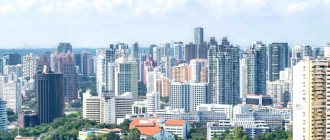1. A residential lease agreement is concluded for a period not exceeding five years. If the contract does not specify a term, the contract is considered to be concluded for five years.
2. The rules provided for in paragraph 2 of Article 677, Articles 680, 684 - 686, paragraph four of paragraph 2 of Article 687 of this Code are not applied to a rental agreement for residential premises concluded for a period of up to one year (short-term rental), unless otherwise provided by the agreement .
- Article 682. Payment for residential premises
- Article 684. Preemptive right of the tenant to conclude an agreement for a new term
Regulatory framework
The main document regulating all emerging legal relations in this area is the Housing Code of the Russian Federation. In addition to this, the Decree of the Russian Federation dated 12.12. 2014 N 1356 contains definitions of the rules and procedures for calculating fees for renting premises on the basis of a social contract.
There are local and regional documents that specify the amounts and procedures for collecting funds in a given region.
Read about how to conclude a social rental agreement for residential premises, as well as the grounds for terminating the agreement, on our website.
Residential house rental agreement
Kurgan April 25, 2022 Afanasyev Konstantin Anatolyevich, born on May 29, 1990, passport: XXXX XXXXXXX, issued by the department of the Federal Migration Service of Russia for the Kurgan region in the city of Kurgan on May 20, 2010, hereinafter referred to as Landlord I Konstantinov Afanasy Pavlovich, born on June 27, 1980 birth, passport: ХХХХ ХХХХХХ, issued by the department of the Federal Migration Service of Russia for the Kurgan region in the city of Kurgan on June 28, 2000, hereinafter referred to as the Tenant. We have entered into this agreement as follows: The
preamble traditionally includes:
- name of the transaction type;
- place and date of conclusion of the document;
- names and roles of parties to the agreement;
- passport details of the parties to the transaction.
In the preamble of the lease agreement, instead of an individual, that is, a citizen, the Tenant will be a legal entity. Accordingly, the roles of the parties to the agreement would change to the Lessor and the Lessee. Further, the document contains clauses containing essential conditions. These include:
- subject of the agreement;
- term of the contract;
- cost of rent (hiring);
- duties and responsibilities of the parties.
What does it consist of?
What are the charges?
From the laws regulating the procedure for collecting money for the provision of housing and public services, it follows that it consists of:
- payment for the use of living space . This means directly paying money for the fact that the premises are provided for living;
- money for utilities . This indicator varies greatly depending on exactly how many resources (electricity, water, gas, etc.) the employer spends;
- bills for current repairs.
Typically, the total amount of the fee consists of the listed parts. The amount of payments is not determined randomly or unreasonably.
There is a certain procedure for calculating fees for renting municipal housing and requirements for collecting payments.
Read about the grounds for expulsion, eviction and relocation from municipal housing in our article.
Installed by whom?
The total amount of payment for housing and utilities under a social tenancy agreement is established in accordance with one of the options:
- public authority;
- local government body;
- directly by the lessor, after agreement with the competent authority.
In practice, this means that the initial cost for the provision of real estate is specified in the contract . When concluding an agreement, it is better for the employer to immediately pay attention to the amount of payment.
It can be changed no more than once within 3 years . However, this does not apply to such a general economic phenomenon as indexation . It may affect the total amount of housing payment.
Thus, the landlord has the right to increase the price under a social rental agreement, however, under the conditions specified by law.
Reimbursement for the cost of utilities is made in accordance with the general tariffs established for the use of a particular resource.
Find out on our website whether it is possible to change or rent out an apartment received under a social tenancy agreement.
Social houses in the capital: what do they give to pensioners and from whom do they protect them?
It is visitors from the regions who dream of an apartment in Moscow, and the native residents of the city, with the advent of old age, are often glad to get rid of it as soon as possible. The fact is that the capital’s golden square meters have always attracted all sorts of scammers like a magnet. Most often, gullible elderly people become victims of their deception. Under the guise of help, the last thing they need is taken away from the elderly - housing. What to do if black realtors are hunting for your apartment? Or is your health simply failing, and there is no one to care for you? Whose help can older Muscovites count on?
Stumbling meter
Elderly city residents have found safety and care in social housing for many years. In one of them, in the Mitino area, RG correspondents met Evdokia Ivanovna Nedelchik. A sociable woman with a posture like a young one, a cheerful smile... It’s hard to believe that she is already 91. “Our people live a long time, there are even 96-year-olds,” Evdokia Ivanovna answers the compliment without hesitation. “The secret is simple - we have no worries!”
He hospitably invites you to his 869th apartment. We cross the threshold and it’s like we’re traveling back in time: a sideboard with crystal, a cabinet with books and souvenirs, a sofa bed, a folding table, a buffet with dishes in the kitchen... “I moved all my furnishings here,” explains the hostess. And the story continues:
“In the 90s, my husband and I were left alone. I didn’t have children, and his daughter from his first marriage went abroad. We lived in a two-room apartment on Mira Avenue, next to VDNKh. In the 70-80s, mainly creative and scientific intelligentsia lived in the house. But in the 90s, many apartments were sold. Some went abroad for permanent residence, others went out of town and built their own houses. Those who bought the apartments turned out to be not the most pleasant neighbors. And those were the times - black realtors tried to get close. They called us, asked if we were renting out an apartment, offered either an exchange or relocation, they even made threats. Life became scary, and then we decided that we needed to look for quieter housing,” recalls Evdokia Ivanovna. By chance she heard on the radio about a social home in Mitino. It turned out that the city is offering elderly Muscovites to move, receiving in return for their housing a full-fledged apartment in a modern high-rise building with 24-hour security, attentive staff and good service. Evdokia Ivanovna is an economist with extensive experience; from 1961 she worked at the Kremlin Palace of Congresses in her specialty until her retirement. It was not difficult for her to calculate how profitable this offer was.
“My husband and I were one of the first to move into a brand new social house,” she recalls. “We donated our apartment to the city fund, and then we received the same two-room apartment with good repairs, a spacious loggia, and a separate bathroom.”
Local workers, like other pensioners, helped with the move. We arranged furniture, household appliances, and did everything as the couple wanted. “I have been living here for more than 20 years and have never regretted my decision,” shares Evdokia Ivanovna. “When my husband developed dementia, he received care here that I could not have provided alone. And he was sick for almost a year.”
Second house
Another native Muscovite, Galina Ivanovna Peregontseva, lives in the neighboring apartment 870. In December she will celebrate her 77th birthday, and in March she will celebrate a decade since she decided to move from her two-room apartment on Bolshaya Polyanka to a social house. It would seem, how can you change such a prestigious place of residence to the outskirts of Mitino? I changed it. And also out of fear of scammers, although I have family and friends. “Even the most run-down apartment in Moscow attracts the attention of black realtors. And all my life I lived in the very center: I was born and grew up in the Meshchansky district, then I moved to Yakimanka,” said Galina Ivanovna. — In 2004, my husband left, and a little later my mother. I turned to social security for help, and that’s where they told me about these houses.”
I weighed the pros and cons for almost six months. As a result, I moved into a one-room apartment in a social house. I had to say goodbye to some of the furniture. The luxurious kitchen set did not fit in all - instead of an almost 12-meter kitchen, there was an 8.5-meter one, and a huge bed did not fit in the room. “Of course, there are moments of sadness for the old apartment,” admitted Galina Ivanovna. “But when I listen to how everyone is deceiving me, I understand that moving was the best option for me.”
She has more than enough energy. As in her youth, she chooses what outfit to appear in front of her friends, with whom she often meets in the city center to discuss the latest news, talk about art and literature: “The metro is nearby, half an hour - and I’m already on Arbat. There we meet friends, go to exhibitions and theaters together. And I always return home with joy, because here I feel wonderful. But you don’t have to go anywhere - we have a beautiful landscape park nearby for walks.”
There is also something to do in a social house. Literary salons, dance and vocal clubs, as well as all the possibilities of the Moscow Longevity program are available to everyone.
On suitcases
There are now four social houses in Moscow: three in the north-west of the city in the Mitino area and one in the south-east - in the Maryino area. Modern high-rise buildings with security, 24-hour control rooms and medical centers. The apartments are different - small one-room apartments of 27 square meters. m, larger one-room apartments - 34 sq. m and two-room apartments - from 48 to 52 square meters. m. In total, there are 483 apartments in the social housing complex. Mostly single pensioners move there. The average age of residents is 78 years. The contract for the transfer of real estate is concluded with the State Unitary Enterprise "Mossotsgarantiya". Pensioners are offered several apartments in the building to choose from. They warn that after moving, their previous home will be auctioned off at the city auction. However, if someone wants to live on their own again, they will find an equivalent apartment.
72-year-old Elena Nikolaevna Chesnokova, our reader, has been living in the house for only a couple of years. The story is similar: after the death of her husband, she was left alone and accidentally found the company’s phone number in Rossiyskaya Gazeta. Without hesitation, I exchanged a one-room apartment with an area of 37 square meters on Voykovskaya for an apartment in Mitino. “All services are just a call away, there is a telephone in every apartment. For example, a washing machine breaks down, a technician will come the same day and do everything for free,” says the pensioner.
Along with the renovated apartment, residents of the building receive monthly monetary compensation from the city, are completely exempt from utility bills and are entitled to free and discounted services. No one is encroaching on their pension.
Help "RG"
Advice on moving into a social residential building can be obtained from the State Unitary Enterprise “Mossotsgarantiya” by phone: +7 (495) 981-07-99,.
When and to whom to pay?
According to Article 155 contained in the Housing Code of the Russian Federation, payment must be made before the 10th day of each new month that follows the expired one. However, a different procedure may be specified in the contract, in which case the payment is made in accordance with the established schedule.
The payer transfers funds for living in the premises under a social lease agreement directly to the owner of the property. This may be a municipality or a relevant government agency.
Who is exempt from payment? , families recognized as low-income are completely exempt from paying money for the use of a residential property of state and municipal property .
Low-income families are recognized by competent authorities “locally” based on an analysis of the income accruing individually to each family member and other important indicators.
must pay for utilities .
Subject of the agreement
The subject of such an agreement is the residential building itself and a description of its characteristics. Such characteristics are: address, total area of the residential building, number of rooms in it, and attached components. In the paragraphs of the document, such information is written as follows:
The Landlord transfers to the Tenant the right to use a residential building, which is located at the address: Kurgan region, Kurgan city, Lesnikovo village, building 576 with a land plot. The owner of the residential building is the Landlord according to an extract from the register of real estate of the Russian Federation. The residential building includes: 2 (Two) floors, 7 (Seven) rooms including a kitchen, 2 (Two) restrooms and 1 (One) storage room. The area of the facility is 107 (One hundred and seven) square meters. The property includes additional structures and buildings attached to it: parking for two cars, a bathhouse, a summer veranda. There is a plot of land measuring 10 (ten) acres. This agreement is concluded for a period of 12 (Twelve months) from the date of signing of the document by the Parties. If the Landlord does not want the Tenant to use the structures attached to the house, this must be stated in this agreement.
Rates
What does it consist of and what does the tariff for the provision of municipal housing depend on? The tariff for the provision of municipal housing is one of the items in the total payment for the use of such housing.
It is unequal throughout the country or even one region. This is determined by the fact that the tariff is determined by certain criteria:
- convenience of the location of the room;
- comfortable conditions;
- livability and quality of housing;
- footprint.
The tariff is set per 1 sq.m. area of the home.
However, the law determines the maximum and minimum of such payment.
In addition to taking into account the characteristics of the living space itself, the fee is lower in the regions than, for example, in Moscow.
Not for everyone! Who can get housing on social security?
Alas, not everyone can rent housing from the state. To do this, you must definitely need housing and at the same time be low-income . And even this is not enough. Low-income people and those in need of housing need to meet a couple more important conditions.
Important! Housing will not be provided if you or your family members are already renting social housing (an exception may only be if the housing is smaller in area than the norm).
The all-Russian norm of living space per person according to the Housing Code of the Russian Federation is 12 square meters. m per person.
However, this norm may be different in different regions . For example, in Moscow, Moscow region, Nizhny Novgorod, Krasnodar, Yekaterinburg, local authorities made it equal to 10 squares. In St. Petersburg and the Leningrad region there are 9 squares, in Ufa, Stavropol, Novosibirsk, Krasnoyarsk, Yaroslavl, Perm - 12, in Volgograd - 11, in Omsk - 15.
Some people who are both needy and low-income can get housing without a waiting list (in fact, there is a waiting list among them too, only shorter). These are people with diseases such as epilepsy and cancer in extremely severe forms. A complete list of diseases can be found in Order No. 958 of the Russian Ministry of Health. Also, out-of-turn housing can be provided to orphans and those living in dilapidated houses . In addition to the poor, the following can count on social housing:
- disabled people of groups I and II;
- veterans of the Great Patriotic War;
- people who lost their homes due to catastrophes and natural disasters;
- military.
In some regions, social awareness is available to large and single-parent families, as well as young professionals.
How to get an apartment for free from the state







